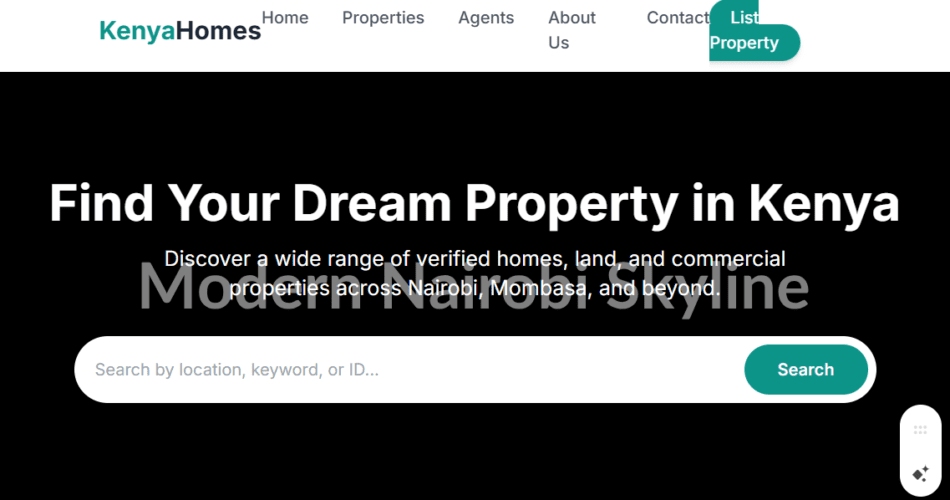Real Estate Software Kenya
- Delivery Time2 Weeks
- English levelProfessional
- LocationUSA, United Kingdom, United Arab Emirates, New York, Nairobi, Kilimani, Kenya, Dubai, CBD Nairobi, Canada, Australia
Service Description
The cost of Real Estate Software in Kenya is 1000000KES .Get Real Estate Software in Kenya at a price of 900000KES at Black Shepherd Technologies.
Streamline your real estate operations in Kenya with cutting-edge software. Discover all-in-one solutions for property management, CRM, rent collection via M-Pesa, automated accounting, and marketing. From agents and landlords to developers, our comprehensive guide helps you find the perfect software to boost efficiency, enhance tenant communication, and drive business growth in Kenya’s dynamic property market.
The real estate sector in Kenya is undergoing a rapid digital transformation, with an increasing number of professionals, from individual landlords and real estate agents to large-scale developers and property management firms, embracing technology to stay competitive. Real estate software in Kenya is no longer a luxury but a necessity, providing a powerful suite of tools to automate complex processes, improve communication, and gain valuable business insights. These digital platforms are tailored to the unique demands of the Kenyan market, integrating seamlessly with local payment systems like M-Pesa and addressing specific challenges such as managing a diverse portfolio of properties, tracking tenant data, and ensuring financial transparency.
For Property Managers and Landlords
At its core, real estate software for property managers and landlords is designed to simplify daily operations and maximize returns. The days of juggling multiple spreadsheets, paper files, and manual accounting are quickly becoming a thing of the past. Modern property management systems offer a centralized platform to manage every aspect of a rental portfolio. Key features include:
Rent Collection and Financial Management: This is arguably the most critical function. Kenyan-specific software platforms often integrate with mobile money services like M-Pesa, allowing tenants to make payments directly and automatically. The system then generates e-receipts and updates tenant ledgers in real-time. This eliminates the hassle of manual reconciliation, reduces payment delays, and improves cash flow. The integrated accounting modules handle everything from invoicing and expense tracking to generating detailed financial reports like income statements and balance sheets, making tax season a much simpler process.
Tenant and Lease Management: Software solutions provide a comprehensive database for tenant information, including contact details, lease agreements, and payment history. They automate repetitive tasks such as sending payment reminders, demand notes for arrears, and lease expiration alerts via SMS or email. This proactive communication enhances tenant relations and retention, while also helping property managers to enforce rental terms and manage debt effectively.
Maintenance and Work Order Tracking: Tenants can log maintenance requests through a dedicated portal, and the system can automatically create work orders for caretakers or contractors. This streamlines the repair process, ensures timely resolution of issues, and provides a clear audit trail of all maintenance activities, which is vital for both landlords and tenants.
Document Management: Secure cloud-based storage for all essential documents, including lease agreements, tenant IDs, and financial records, ensures that paperwork is organized, easily accessible from anywhere, and backed up against loss.
For Real Estate Agents and Sales Teams
Real estate agents in Kenya are leveraging technology to optimize their sales pipelines and enhance client relationships. Customer Relationship Management (CRM) software is a game-changer for this segment of the industry. These platforms are built to manage the entire sales cycle, from lead generation to post-sale follow-up.
Lead Management and Tracking: A robust real estate CRM captures leads from various channels—including online portals, social media, and website inquiries—and centralizes them in one place. Agents can then track the progress of each lead through the sales pipeline, set automated follow-ups, and ensure no potential client falls through the cracks.
Property Listing and Marketing: The software can automate the process of listing properties across multiple online portals and social media platforms, significantly increasing a property’s visibility. Many solutions also offer marketing automation tools, such as email and SMS campaigns, to effectively engage with potential buyers and investors.
Client Communication and Collaboration: By centralizing all client interactions—emails, calls, and meeting notes—the CRM provides a comprehensive view of each client’s history. This allows agents to provide a more personalized and professional service. Multi-user access and collaboration features also ensure that team members are always in sync, whether they are in the office or in the field.
Sales Analytics: Real-time dashboards and reports give agents and managers a clear view of their sales performance. They can track metrics such as lead conversion rates, sales cycle duration, and team productivity, enabling them to make data-driven decisions to improve their strategies.
For Real Estate Developers
Developers are utilizing specialized real estate and construction ERP software to manage the complex, long-term processes of their projects. These solutions provide a holistic view of operations, from project planning to resource allocation and sales management.
Project Management and Cost Control: Developers can use the software to plan, schedule, and track the progress of their projects in real-time. This includes resource allocation, milestone tracking, and budget monitoring, which are crucial for delivering projects on time and within budget.
Inventory and Unit Management: For large developments, the software helps in managing the inventory of available units, tracking sales, and monitoring occupancy. This provides a clear, real-time overview of the project’s sales performance and helps in strategic planning.
Financial and Accounting Integration: The software integrates all financial processes, from managing supplier payments and change orders to handling billing and invoicing, ensuring accurate financial oversight and compliance.
Client Handover and Communication: Developers can use the platform to manage the client handover process, track post-sale service requests, and maintain clear communication with buyers, ensuring a smooth and professional experience from start to finish.
The Kenyan Context: PropTech Trends
The evolution of real estate software in Kenya is directly influenced by local trends, including the rise of PropTech (property technology). This includes innovations like:
Virtual Tours and 3D Walkthroughs: A growing number of developers and agents are adopting immersive technologies to showcase properties to a wider audience, including diaspora investors who cannot physically visit sites.
Digital Land Registries: The government’s digitalization of land records through platforms like Ardhisasa is helping to reduce fraud and streamline due diligence, a process that real estate software can help to integrate.
AI-Powered Matchmaking: Some PropTech companies are using AI algorithms to match buyers with properties based on their specific preferences and budgets, a feature that is set to become more common in mainstream software.
In conclusion, the real estate software landscape in Kenya is a dynamic and expanding market. The key to success lies in choosing a solution that is scalable, secure, and specifically tailored to the unique operational and financial requirements of the Kenyan property industry. By embracing these powerful tools, real estate professionals can unlock new levels of efficiency, transparency, and profitability.








